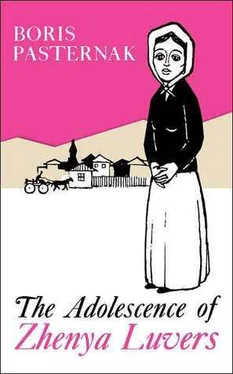She had not expected that all her excitement would turn into such a lighthearted joke. Divide so many ells and inches by seven! Was it worth while to learn all these “dols, zolotniks, lots, pounds and poods?” The grams, drams, somples and ounces, which always seemed to her like the four ages of the scorpion? Why does one write “polezno” with an “e” and not with a “yat”? The answer was so difficult for her only because she strained her imagination to envisage why a “yat” should suddenly appear in the middle of a word, although it made the spelling look so wild and unkempt. And her coffeebrown school uniform, cut out but still held together with pins, was fitted to her for hours. And her room already held many new horizons: school satchel, pen case, lunchbox and a remarkably repulsive eraser.
The little girl was wrapped from head to knee in a thick woolen muffler and ran about the yard like a chicken. Zhenya wanted to go to the Tartar girl and speak to her. And at that moment a casement window flew open. “Kol’ka!” Aksinya called. The child, who looked like a peasant’s bundle with felt boots hastily attached, ran into the porter’s quarters.
To take schoolwork into the yard always meant brooding so long over some comment on a rule that it lost all sense, with the result that one had to return home and start all over again. On the very doorstep, the rooms began to weave their spell, with their special twilight, their coolness and their always surprising familiarity; it emanated from the furniture standing in its proper place for all time. The future could not be foreseen, but it could be seen when one stepped into the house from outside. Here its plan was made evident—the distribution of those forces to which it would be subjected. And there was no dream blown in by the of the yard, between the porter’s lodge and the coachhouse, bordered on somebody else’s garden.
Zhenya went to the place where the firewood was stacked. She wedged a flat log under the ladder which leaned against it to prevent it from slipping, and sat, uncomfortable and strained, as if in a game, on one of the middle rungs. Then she got up, climbed higher, put the book on the top step and attempted to deal with the “Demon.” Then she discovered that it was more comfortable sitting below and made her way down, leaving the book on the woodpile, without noticing it—because it was just then that she discovered something on the other side of the garden that she had never suspected. As if under a spell, she stood open-mouthed.
In the strange garden there were no bushes, and the ancient trees, stretching their lower branches through the foliage as into dark night, sheltered the garden beneath, which lay in a constant, solemn but airy twilight, from which it never emerged. The branches were forked, painted violet by the weather, covered with gray lichens, and left open a view of an empty, little-used street on the other side of the garden. There a yellow acacia stood. Its leaves were now dry, shrunken and falling.
Transformed by the dusky garden from this world into another, the empty side street shone like an event in a dream, very bright, sullen and still, as if the sun, with spectacles on its nose, were rummaging in a crowfoot.
What then made Zhenya open her mouth in wonder? A discovery that interested her far more than the people who helped her make it Was there a small shop…? Behind the garden gate… In such a street… “The happy ones”… She envied the unknown women. They were three.
They were black, like the word “nun” in the song. Three symmetrical necks bowed under round hats. The outermost one, half-concealed by a bush, was leaning on something and seemed to be asleep. The other two, nestling tightly against her, were also asleep. The hats were blue-black, they shimmered in the sun and then went out, like fireflies. They were entwined with black crepe. At this moment, the unknown women turned their heads and looked in another direction. Something at the far end of the street had obviously attracted their attention. They stared that way for a minute, as one stares in the summer when the light dissolves a second and draws it out, when one blinks and has to protect one’s eyes with a hand—they stared for a moment, and then sank back into their former state of sleepy immobility.
Zhenya wanted to go into the house, but she missed her book and could not remember immediately where she had left it. Then she went to fetch it and when she reached the woodpile she saw that the unknown women had moved and were about to leave. They walked in Indian file to the garden gate. A small man with the peculiar gait of the lame followed them. He carried under his arm a gigantic album or atlas. So that was what had occupied their attention when they were looking over each other’s shoulders and she had thought they were asleep! The strangers walked through the garden and disappeared behind the farm buildings. The sun set. Zhenya reached for her book and slipped on the logs. The woodpile woke up and moved as if it were alive. A few logs slid down and fell onto the grass with a quiet bump. This was the sign, like the nightwatchman’s tap with the door knocker. The evening was born. From the other side of the river the air whistled an old tune.
The yard was empty. Prokhov had finished his work and gone outside the gate. Out there the melancholy strumming of a soldier’s balalaika now glided closely, very closely, over the grass. Above it danced a thin swarm of mosquitoes. The strumming of the balalaika grew still thinner and fainter. It sank deeper toward the earth than the insects, but it never quite fell into the dust; lighter and airier than the mosquito swarm, it rose, twinkling and dissolving in peaceful harmonies.
Zhenya returned to the house. “Lame,” she thought of the unknown man with the album, “lame but a gentleman without crutches.” She went in by the back door. The yard smelled sweetly and obtrusively of camellias. “Mama has a regular drugstore, a mass of little blue bottles with yellow caps.”
She walked slowly up the stairs. The iron railing was cold. The steps creaked in response to her dragging pace. Suddenly a strange thought entered her mind. She took two steps at a time and stopped on the third. She discovered that there had existed for some time an inexplicable likeness between her mother and the porter’s wife. It was quite inexplicable. She stood still. It is, she thought, like when one says, “We are all people” or “We are all baptized with water” or “Fate makes no difference….” She pushed away a fallen bottle with the tip of her foot, and it fell below on the dusty mat without breaking. She thought, “It is something quite universal, something that all men have in common.” But why, then, was there no likeness between herself and Aksinya? Or between Aksinya and Ulyasha? This seemed all the stranger to Zhenya because two more different persons could hardly be imagined. Aksinya had an earthy quality, like a vegetable garden, which recalled a knobby potato or a swollen gray-green pumpkin, but Mama… Zhenya smiled at the mere thought of the comparison.
But it was Aksinya who gave the tone to this pressing comparison. It was she who had the superiority. The peasant woman lost nothing by it, but the lady lost something. For a second Zhenya had a crazy thought. It seemed to her that something simple and rural had entered into the essence of her mother, and she imagined her saying “ap’l” instead of “apple” and “wo’k” for “work.” Maybe the day will come, she thought, when she wears her new beltless silk morning dress and sails in like a ship and greets us with peasant words. The corridor smelt of medicine. Zhenya went in search of her father.
Читать дальше










